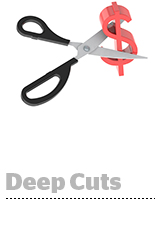 Here’s today’s AdExchanger.com news round-up… Want it by email? Sign up here.
Here’s today’s AdExchanger.com news round-up… Want it by email? Sign up here.
Snip Snip
P&G will cut $400 million more dollars in agency and production fees before the end of its fiscal year on June 30. That’s in addition to the $750 million the CPG giant has already cut in agency fees since mid-2015, bringing its total agency spend down from $2 billion to $1.15 billion. P&G will also increase the percentage of agencies culled from its roster from 60% to 80% and will transition from an agency-of-record model to more open-sourced project work. “Open sourcing in this context means we will look both at our existing agency partner who is on retainer in addition to other agencies on our roster for the project-based assignments to determine the best quality, capability and value for each project,” P&G spokeswoman Tressie Rose told AdAge. “If a crowd-sourcing platform makes sense, we would consider this, but our first step will be to look at our roster agencies.” More.
Watch Me Now
Snap is planning to double the number of original video shows released on its platform to roughly 80 this year, Digiday reports. Some of those new releases may include Snap’s first scripted shows, pitting the platform against Facebook and YouTube in the fight for the future of digital video. Unlike Facebook Watch, which foots the production costs for some publishers’ TV shows, Snap show producers fund their own content and get paid on an ad rev-share model. That structure has caused networks like CNN to stop publishing on Snap because they weren’t making enough to justify the investment. But those willing to take the risk get ownership of their content, which they can eventually extend to other platforms. More.
FB Vs. GDPR
Facebook has been sending notice to advertisers advising on GDPR – but the social media giant may need some guidance of its own, according to the Financial Times. The FT cites a study from Charles III University of Madrid that claims Facebook’s own data policies will violate GDPR, “threatening its ability to sell advertising based on targeted user information.” The study claimed 73% of European Facebook users were targeted by marketers based on personal characteristics, which would be illegal under GDPR. But Facebook, through a spokesperson, said that sort of targeting isn’t happening: “Facebook shows ads based on topics we think people might be interested in, but without using sensitive personal data.” Read more.
Hole In The Net
Net neutrality is one step closer to repeal. On Thursday, the FCC published its “Restoring Internet Freedom” order – aka net neutrality’s death warrant – to the Federal Register. Most of the changes will take effect on April 23, giving Congress 60 days to overturn the FCC’s efforts. The rules still have to be approved by the Office of Management and Budget. What’ll actually happen on April 23? Probably nothing much, writes The Verge. But over time, subtle changes could affect how the internet functions. One of them is zero rating, which allows ISPs to offer free data when using certain services and could ultimately result in less choice for consumers. For advertisers, it may mean being at the mercy of ISPs, which could prioritize their own properties and control competitors’ ad delivery speeds [AdExchanger coverage]. If you’re a glutton for punishment, the FCC’s proposed order of rulemaking is available here in its entirety.
But Wait, There’s More!
You’re Hired!
This post was syndicated from Ad Exchanger.

More Stories
The Year in Weather: The Weather Channel and Fox Weather Enjoyed Significant Viewership Spikes
‘Don’t take things too seriously”: Cassidy Meredith looks back on 2024
ADWEEK Reporters Share Their Favorite Stories of 2024